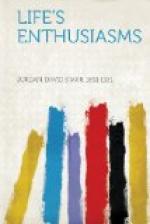In the arts of music and painting and sculpture, one may find not only professional satisfaction, but the strength that comes from higher living and more lofty feeling. In the study of history as biography, the acquaintance with the men and women of other times, those who have felt and thought and acted and suffered to make a freer world for you and me, like inspiration may be found. History is more than its incidents. It is the movement of man. It is the movement of individual men, and it is in giving illumination to personal and racial characters that the succession of incidents has its value. The picturesque individual, the man who could not be counted with the mass, the David, the Christ, the Brutus, the Caesar, the Plato, the Alfred, the Charlemagne, the Cromwell, the Mirabeau, the Luther, the Darwin, the Helmholtz, the Goethe, the Franklin, the Hampden, the Lincoln, all these give inspiration to history. It is well that we should know them, should know them all, should know them well—an education is incomplete that is not built about a Pantheon, dedicated to the worship of great men.
With all this comes that feeling of dedication to the highest purposes which is the essential feature of religion. Religion should be known by its tolerance, its broadmindedness, its faith in God and humanity, its recognition of the duty of action.
And action should be understood in a large way, the taking of one’s part in affairs worth doing, not mere activity, nor fussiness, nor movement for movement’s sake, like that of “ants on whom pepper is sprinkled.” As the lesser enthusiasms fade and fail, one should take a stronger hold on the higher ones. “Grizzling hair the brain doth clear” and one sees in better perspective the things that need doing. It is thus possible to grow old as a “grand old man,” a phrase invented for Gladstone, but which fits just as well our own Mark Twain. Grand old men are those who have been grand young men, and carry still a young heart beneath old shoulders. There are plenty of such in our country to-day, though the average man begins to give up the struggle for the higher life at forty. President White, President Eliot, President Angell,—few men have left so deep an impression on the Twentieth Century. Edward Everett Hale, the teacher who has shown us what it is to have a country. Senator Hoar, Professor Agassiz, Professor Le Conte, Professor Shaler,—all these, whatever the weight of years, remained young men to the last. When Agassiz died, the Harvard students “laid a wreath of laurel on his bier and their manly voices sang a requiem, for he had been a student all his life long, and when he died he was younger than any of them.” Jefferson was in the seventies when he turned back to his early ambition, the foundation of the University of Virginia. The mother of Stanford University was older than Jefferson before she laid down the great work of her life as completed. When the heart is full, it shows itself in action as well as in speech. When the heart is empty, then life is no longer worth while. The days pass and there is no pleasure in them. Let us then fill our souls with noble ideals of knowledge, of art, of action. “Let us lay up a stock of enthusiasms in our youth, lest we reach the end of our journey with an empty heart, for we lose many of them by the way.”




